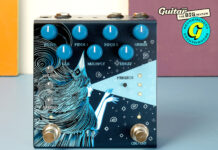
The Genius Of… The Process of Belief by Bad Religion
If Bad Religion’s music – fast, knotty punk with its roots firmly in the earliest thrashings of the Los Angeles hardcore scene – has always suggested a charge to the finish line, its potency also owes plenty to a series of gaps, pauses, break-ups and exits in the band’s 40-year history. The Process of Belief, which turns 20 in January 2022, has become a key blueprint in their late career renaissance, driven on by a keen contextual understanding of their own work and the return of a prodigal son in the form of guitarist Brett Gurewitz.
READ MORE: Electro-Harmonix Nano Deluxe Memory Man review: big-box vintage delay tones in a pedalboard-friendly package
The LP reunited vocalist Greg Graffin with his long-term sparring partner for the first time in almost a decade while helping to usher the band out of major label stasis and back into the welcoming arms of Epitaph, Gurewitz’s label and a cornerstone of the punk explosion of the mid-1990s thanks to the Offspring’s Smash becoming the biggest selling independent record of all time on their watch. It also ensured that three of hardcore’s most important guitarists – with Gurewitz slotting in alongside Greg Hetson, also of Circle Jerks, and Brian Baker, whose resume features stints in Minor Threat and Dag Nasty – lived under the same roof for a time.
Straight to hell
Bad Religion came together in Los Angeles in 1980 and existed in a state of chaos in the early part of their tenure. Gurewitz formed Epitaph in order to put out their first 7” in 1981, while their classic 1982 debut How Could Hell Be Any Worse? was followed by Into the Unknown, a synth-rock dud that has gone down in history as one of punk’s great missteps, a year later. It helped put the band on the slab until 1985, when Hetson was called up to replace Gurewitz, who was dealing with a drug problem. This line up, also sans bassist Jay Bentley, would last a matter of months and one EP, Back To The Known.
In 1988, everything changed with the release of Suffer. The LP, recorded with Gurewitz and Hetson in tandem and a rhythm section of Bentley and Pete Finestone on drums, was the first shot in a salvo that would help reshape the punk landscape in anticipation of its huge crossover several years later. No Control (1989) and Against the Grain (1990) furthered Bad Religion’s research into breakneck speed, precise melodies and multi-part harmonies (the oozin’ aahs in the band’s parlance) and set the table for their own moment in the mainstream spotlight.
Released in 1994, Stranger Than Fiction marked a move to Atlantic Records and Gurewitz’s acrimonious second exit. He said they’d sold out, they said he was on drugs, he said he wanted to focus on Epitaph, everyone said he and Bentley had fallen out. Either way, the record went gold and ensured that Gurewitz was both an architect of and participant in the year that punk broke.
Wilderness, almost
Bad Religion’s time on Atlantic wasn’t a total bust, but it was a period of diminishing returns. Stranger Than Fiction ripped, and yet it was almost a holdover from a golden age. The Grey Race, No Substance and The New America (produced by pop weirdo Todd Rundgren) weren’t bad records but they were made by a band fading from view. They weren’t at the front of any conversations anymore.
“When we made The New America it was like, ‘Fuck!’ It was as if we’d gone to the end of the rainbow and there was just a pot of shit,” Bentley told Chartattack. “I don’t want to seem like a total asshole about the album and Greg really did spend a lot of time writing it so I can’t blow him out of the water saying ‘It’s all your fault!’ We had a long talk about it and I was like, ‘You’re not a monkey with a typewriter. I can’t scream at you to go back in and write better music. If you’re happy with it, I don’t care.’”
He added: “The album came out and it was just okay. I was like, ‘So this is it? The mighty Bad Religion goes out with this tiny whimper?’ It wasn’t as bad as Into The Unknown, but it was a Filet O’Fish. ‘What is this? Well, it’s got some wood particles in it. It only has to be 60 per cent fish. The rest is filler.’”
Image: Jeffrey Mayer / WireImage
Back again
Tucked inside the bun on that Filet O’Fish, though, was an interesting morsel: writing and lead guitar credits for Gurewitz on the song Believe It. The Epitaph explosion and the plate-spinning that followed, with the Offspring moving to Columbia for 1997’s Ixnay on the Hombre in a gut-churning tug of war, had taken its toll. “I nearly died,” Gurewitz told LA Weekly in 2002. “I was arrested after I OD’d, and someone called 911. Cops found dope on me. After I came out of it, they waited about two months before they came by to arrest me for felony possession. They surrounded my house, pulled guns on me; they thought I must be some big dealer because I lived in a nice place.
“I asked if they had a search warrant, they said they had an arrest warrant. They cuffed me and took my heroin stash from one pocket in my bathrobe and a bag of rock coke from the other and said, ‘Congratulations, this is your second felony offense.’ I was scared shitless. I had no criminal record. I got a six-month sentence, suspended, provided I didn’t test dirty. I’d rather be dead than in jail. I got clean in December ’97 after seven attempts at rehab, but it was fear of jail that finally saved my life.”
Believe It was an olive branch of sorts. Just before the millennium, lines of communication opened up again between the estranged bandmates. The Process of Belief reinstated Graffin – whose extracurricular work includes a PhD in zoology at Cornell plus several books and stints lecturing – and Gurewitz as a full-time concern for the first time since Stranger Than Fiction, a record they came to view as a benchmark.
They wrote competitively, seeking to one-up each other and using the friction to light a fire under the band. “Brett will write a song and go, ‘Check out my new song,’ and you can just see Greg going ‘Fuck!’ And then he goes back to him and goes ‘Check out MY new song,’ and you can see Brett going ‘Fuck!’ and now they have two songs,” Bentley told Skratch.
Image: J. Shearer / WireImage
Destined for something
This might be a record built around repairing relationships and a good-natured sort of one-upmanship, but the ace up its sleeve is a perceptive read on the role a new Gurewitz-featuring Bad Religion record would have to perform. Right out of the gate Supersonic has the pinwheeling energy of a No Control cut, The Lie calls up the syrupy lead lines of Against the Grain opener Modern Man, while Broken is a natural companion to the mid-paced alt-rock anthemics of the so-nice-they-recorded-it-twice 21st Century Digital Boy. The darkness of Generator, that sometimes overlooked black sheep, courses through Epiphany.
The Process of Belief was tracked at Sound City Studios and Westbeach Recorders, Gurewitz’s studio, with new drummer Brooks Wackerman making his debut for the group. Les Paul Standards are always in heavy rotation with any Bad Religion record, particularly as the main guitars of both Gurewitz and Baker, with Hetson’s sound built around a handful of SGs. In the song’s video, meanwhile, Gurewitz can be seen playing he warm, patient solo to Sorrow on a Telecaster (his is a genuine 1950s model) while his sticker-covered ‘Red Rocker’ was also in the mix
“That’s a single-pickup Charvel I bought in ‘89 while on tour in Boston because mine had gotten stolen the night before,” he told Premier Guitar in 2013, noting mods including an unfinished ESP maple neck, a maple fretboard with jumbo frets, Schaller tuning machines and a Seymour Duncan JB at the bridge, a staple of his Les Pauls.
Image: L. Cohen / WireImage
New maps
The Process of Belief was released in the shadow of 9/11, an event that would spur the anti-Bush, anti-war stance of its teeth-bared follow-up The Empire Strikes First, and at a banner time for clean and tidy takes on punk rock. In a landscape dominated by Blink-182 clones they stood out as anti-trend: when the prevailing mood was glossy and TRL-attuned Bad Religion sounded like Bad Religion.
They didn’t fit in when they were kids surrounded by surfers and jocks. They didn’t fit in when they were almost 40 and surrounded by cookie cutter groups with nothing to say. “My definition of punk de-emphasizes the anger, the violence and all the fashion elements and sticks to a basic principle of human biology: our need to question things,” Graffin once told LA Weekly. “That’s why Bad Religion is a punk band.”
Infobox
Bad Religion, The Process of Belief (Epitaph, 2002)
Credits
Greg Graffin – lead vocals, production
Brett Gurewitz – guitar, backing vocals, production
Jay Bentley – bass, backing vocals
Brian Baker – guitar, backing vocals
Greg Hetson – guitar
Brooks Wackerman – drums
Standout guitar moment
Sorrow
For more reviews, click here.
The post The Genius Of… The Process of Belief by Bad Religion appeared first on Guitar.com | All Things Guitar.
Source: www.guitar-bass.net













